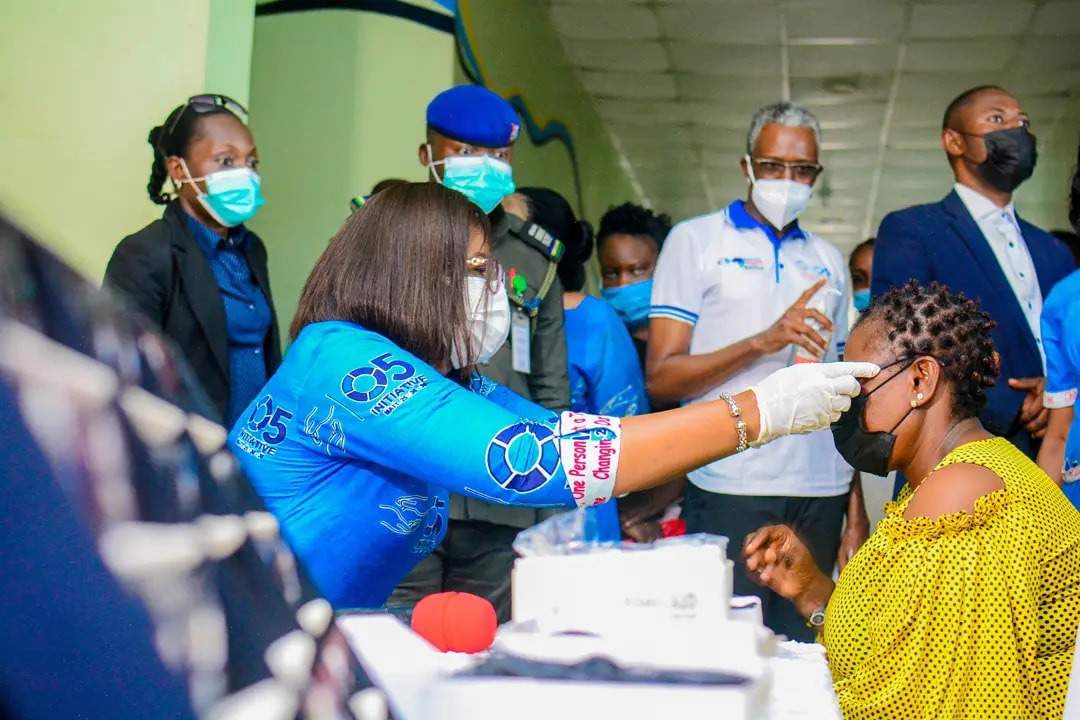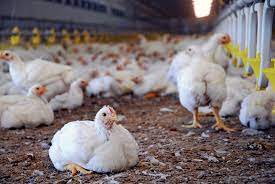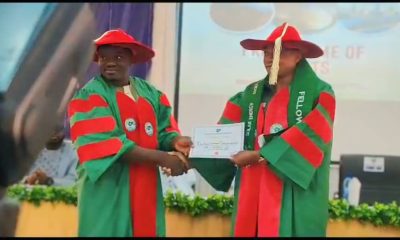community
Optometrist calls for Proper Sensitisation on ‘Crossed Eyes’

An Optometrist, Mr Felix Olafisoye, on Sunday, expressed concern over the lack of sensitisation on ways to prevent strabismus, otherwise called “half past four eyes”. Olafisoye told the News Agency of Nigeria (NAN) in Abuja that strabismus could have direct effect on the appearance of the eye, as it was a condition by which one’s eyes were not always aligned and thus was also known as crossed eyes or walleyes.
That means they don’t work together to look at an object. One may look in or out, or turn up or down. It can happen all the time or only when you’re stressed out or sick. He said the condition had indirect effect, academic, mental and emotional, on a child’s life when ignored by parents and teachers.Olafisoye said that children with strabismus struggled academically and emotionally everyday, without appropriate learning aid and treatment. “It affects a child’s academic performance because of refractive error; such that the child will face an impaired reading performance in school.”The condition is associated with emotional and mental effect on the child, especially for school aged children.”Some faced mockery and humiliation from their peers because of the condition, hence the need for proper sensitisation of parents and children,” he said.
Olafisoye said that parents and teachers should be alert for symptoms of strabismus in their wards because early detection could prevent further deterioration to amblyopia, commonly referred to as ‘lazy eyes’. Mrs Sharon Anthony, a psychologist called for behavioural change to children with strabismus, to prevent psychological trauma and build their confidence.” Children with strabismus may have psychosocial difficulties later in life and this may dissuade such individual from particular occupations such as pilot, armed forces or being a surgeon. “There is the need for more programmes and discussions on strabismus to increase public awareness and advocate for an end to discrimination against children with strabismus. “Parents and teachers should be taught to change their perception towards children with the condition. This understanding will rub-off on other individuals around the child. “It is the first intervention the community can offer to children with strabismus,” she said.
She said that early detection and initiation of treatment are critical in preventing permanent visual impairment. Mr Kelechi Ikenyim, an audio narrator, spoke of his ordeal as a child dealing with strabismus and the adverse effect it had on his general well-being. “Throughout my school years, my condition was mocked at by pupils, parents and sometimes teachers, who called me names and this affected my self confidence over the years. “Reading was a struggle and I relied heavily on learning from listening, while the teacher explained. This was how I scaled through school,” he said.
Ikenyim said that his parents were not aware of his condition, so they could not get help. “My parents were not aware of my condition, so it was left untreated for a while until a neighbour took me to an eye specialist.” It was the first help and support I received that made me look beyond that situation. “I faced stigmatisation for a condition that I did not create. I hated taking pictures because of my eyes, but I decided to change the status quo which is why I chose to be an audio author,” he said. He advised community members and schools to be more pleasant in their daily interactions with children with special needs. She added that making jest of their medical condition does more harm to emotional and mental well-being. (NAN)
community
Poultry Farmers Decry High Cost of Feeds, Low Patronage

Some poultry farmers in Bwari Area Council of the FCT, on Monday in Abuja, decried the incessant rise in the cost of poultry feeds, while also groaning over low patronage in the sale of birds in the market.
The farmers expressed their concerns in separate interviews in Abuja on Monday, while calling on producers and suppliers to consider a reasonable intervention.
One of the farmers, Mrs Joy Felix, said that although poultry farming was a profitable business that involved a lot of capital, it had, however, suffered set backs at the point of sales.
“You spend so much in setting up and most importantly the cost of feed hardly comes down once it goes up. Sometimes it suffers artificial scarcity and then a hike in price when it resurfaces.
“Once it is the fourth quarter of the year when a lot of people keep birds for either personal or commercial purposes during the Christmas season, the rush that comes with it gives the producers of these feeds a high advantage to make money and at the end of the day, you spend so much feeding these birds and then buyers bargain for less.
“It is somewhat frustrating. At the end, you may have to sell at a give-away price so you do not loose.”
Felix added that the cost of drugs for the birds was another challenge to the farmers, who are forced to use organic methods to treat diseases in birds.
“We sometimes use medicinal plants like bitter leaves and pawpaw leaves to either treat minor infections or boost their feeding, except when the situation is severe and in dire need of a veterinarian,” she said.
She urged various farmers’ associations, as well as other stakeholders to intervene and assist in finding a lasting solution to the challenges, with the hope to ease the plight of the farmers.
Similarly, Mr Ayo Bamidele, another poultry farmer, said that the cost of chicken feeds is so high, ranging from N10,000 to N14,000 per 50kg bag in the last one month, depending on the brand and location of farm.
According to Bamidele, a lot of farmers find it difficult to sell their birds during the festivities because, there is usually more supply of the birds than demands for it.
He said: “The cost of feeds has made farmers to put high price on the birds yet, buyers do not have that kind of money to buy them.
“Some of us actually made good breeds grow well enough for the price we put but the buyers don’t know this, they have no idea what it takes to feed and make the birds gain weight.
“Also, with the economic situation, people want to buy but they don’t have the money. It is unfortunate. I wish we all can just help each other make things easy for ourselves.”
He, however, said that he was optimistic that he would make profitable sells against all odds, during and after the yuletide.
Mr Elimah Jacob, a distributor of poultry feeds in Bwari town, said that the high cost of feed was not new but a challenge that usually came with the period of mass poultry farming, especially before December.
He also said that the increase in prices of the feeds was usually from companies that produce the goods, whom, he added, also complained about either scarcity or shortage of raw materials for sufficient production.
Jacob also attributed the challenge to cost of transportation from the suppliers to the distributors, which has risen a great deal.
“We pay for bags of feeds in millions and the transportation, which may be in one or more trailer vehicles, cost a fortune also.
“Most times, you pay in full, yet, it takes several weeks before your supplies arrive because, the demand may be high at that moment and it takes turns to service distributors.
“By the time it finally gets to the point of sale, there is usually a rush for it.”
He noted that the prices, though not constant, may go lower after the Christmas celebration. (NAN)
community
UniAbuja Researchers Win N3bn Grant

The University of Abuja (UniAbuja) says its researchers have won over N3 billion grants in 2023 following their applications to donor agencies for research grants.
The Vice Chancellor, UniAbuja, Prof. Abdul-Rasheed Na’allah, disclosed this on Monday in Abuja during the award ceremony for researchers and authors.
Na’allah said that the 2023 grant of over N3 billion was a significant improvement compared to the N1 billion that was won in 2022.
The vice-chancellor urged those leading in research to share their experiences with others, adding that they should support one another in order to bring in more researchers.
“When you hear information on grant, share it around so more people can participate, this will help the university produce more grant winning researchers.
“There is no world class university if there are no world scholars; we must continue to show this nation that a world class university is achievable and we have achieved it.
“We have made over N3 billion in research grants this year; we are making a mark and we are determined as a university that whatever it will take we must move forward.’’
He said there was need for scholars to invest in research because as they were the things needed to solve the problems facing the nation today.
The vice chancellor urged more scholars to apply for grants.
“What gives you joy as a scholar is research grants you get from outside; you have to keep working on getting a grant until you succeed,’’ he said.
Na’allah called on scholars to think of how to solve the problems of Nigeria such as insecurity, bad leadership among others through their research work.
He said that the university was taking the lead in resolving the problem of leadership, adding that the university would soon establish youth leadership clinic.
He said that this clinic would help to train young people and prepare them to take over the leadership of Nigeria.
The don assured the researchers that the university would not disappoint them as they continue to put the university on the map through this research grant.
He advised authors to ensure that originality was their main focus, adding that they should be innovative and create new words in their works.
Reports that under the researchers’ cadre, seven persons won gold, two silver and 45 bronze while in the authors cadre, eight persons won gold, nine silver and 27 bronze.
Earlier, the Director, UniAbuja Centre for Sponsored Projects (CSP), Prof. Obiageli Nnodu, said the centre was introduced in 2020 by the vice chancellor.
Nnodu, while appreciating the vice chancellor, said that the centre which started small, had grown into something big.
She said the researcher category was bringing extra income, adding that researcher income was adding significantly to the revenue of the university.
One of the awardees, Dr Dike Orji, on behalf of other awardees, appreciated the vice chancellor and the university for their support to all scholars and researchers.
Orji said the recipients would continue to put in their best to see that the university grew in terms of research. (NAN)
community
Abuja Residents Express Mixed Feelings over `Fura da Nono’ Consumption

A cross section of Abuja residents have expressed mixed feelings over the consumption of Fura da Nono.
The residents in separate interviews on Thursday in Abuja, said the unhygienic nature in the preparation of fura da nono put them away from it.
While others are of the views that they don’t mind the preparation process, they enjoy the milk because of its numerous benefits.
Reports says that fura da nono is fermented milk-cereal mix locally.
It is highly nutritious beverage which is a two-in-one product.Consisting of a cereal, ‘fura’ made from millet and ‘nono’ fermented cow-milk product similar to yoghurt.
Mr Adam Ibrahim, a shop keeper at Area 10, Garki said he takes nono because of it nutritional benefit adding that it was a natural drink.
“ I take nono because it is natural, no preservatives and not refined,’’ he said.
He, however, advised that cleanliness must be the watch word when consuming fura da nono, adding that he buys the product from a clean and a reliable vendor.
“There is a lady that packages fura da nono in containers to sell rather than patronising those who carry it in bowls with flies following around,’’ he said.
Tope Faseun, a cosmetologist at the Nyanya market said that nono is healthy and good to be consumed fresh.
She said that taking nono helps to improve the sperm cells of a male reproductive organ.
Mrs Agada Grace, a roasted plantain and corn seller in Garki, said that fura da nono helps to cool her body after staying close to the fire all day.
“Nono is a good drink that refreshes your body after a hard day. For me, the drink helps me to sleep well because it relaxes my body,’’ she said.
Mr Kolade Akin, a cobbler in Garki said that the extraction method, environment and sometimes the unhygienic nature of the persons extracting the milk makes it unhealthy for me.
“The process of extracting nono and also the preparatory method of it, is likely to expose the drink to bacterial and can lead to food burn diseases,’’ he said.
Wale Ridwan, a corps member said that fura da nono irritates him due to the unhygienic method of the extraction and preparation.
“Fura da nono irritates me because of the extraction of the milk and the preparation of the millet which are done manually.
“It is not processed, can be contaminated and can pose a great health challenge to individuals who consume the milk meal and drink,’’ he said.






















